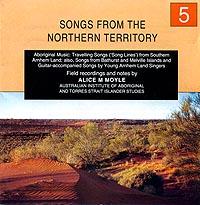Home
| Albums | Films
| Didjeridu
| Library
Traditional
Aboriginal
Arnhem Land Music
Discography Search


|
| Songs
From the Northern Territory 5: Aboriginal Music
- Travelling Songs ('Song Lines') From Southern
Arnhem Land; Also Songs From Bathurst And Melville
Islands and Guitar-accompanied Songs by Young Arnhem
Land Singers |
|
Artist/Collector:
|
Alice
Moyle |
|
Label
Information:
|
Australian
Institute of Aboriginal and Torres Strait Islander
Studies (AIATSIS): AIAS 5 CD |
|
Media
Type:
|
CD |
|
Year:
|
Recorded
1963; Released 1997 |
|
Availability:
|
AIATSIS |
|
 |
| Track
Number |
Track
Title |
Track
Time |
Notes |
|
01
|
Boomerang
clapsticks sounded by Ganbukbuk, Djanbaluwa (i-v) sung
by Garadji with boomerang clapsticks |
0:02:39 |
Ngukurr
1963 |
|
02
|
Yarangindjirri
(i-iii) sung by Mityundurr and Gandukbuk with boomerang
clapsticks |
0:02:09 |
Ngukurr
1963 |
|
03
|
Ngadidji
women's corroboree (i-vi) sung by Yabumana and female
assistants; boomerang clapsticks sounded by Yabumanat |
0:02:42 |
Numbulwar
1963 |
|
04
|
Wandimulungu
(i-vi) sung by Mardi with improvised percussion (substituted
for boomerang clapsticks) |
0:03:29 |
Numbulwar
1963 |
|
05
|
Djarrkun
(i-xvii) sung by Mityundurr with paired sticks |
0:06:36 |
Ngukurr
1963 |
|
06
|
Galwangara
(i-iii), Women's Djarada (i-iii) sung by Wuymalu with
improvised percussion (tin beaten with stick) |
0:03:44 |
Barrunga
1962 |
|
07
|
Army
Tent, Bomb on Darwin sung by boys from Bathurst and Melville
Islands |
0:04:21 |
Darwin
1962 |
|
08
|
Song
words for track 07 spoken by (a) Tauntalum and (b) Pautalura |
0:00:54 |
Darwin
1962 |
|
09
|
Dance
chants from Bathurst and Melville Islands sung by school
boys with hand-clapping |
0:02:37 |
Darwin
1962 |
|
10
|
Words
for track 09 spoken by Tauntalum |
0:00:39 |
Darwin
1962 |
|
11
|
Songs
(Djanba and Balga) by men and women with paired sticks |
0:05:15 |
Darwin
1962 |
|
12
|
(a)
Maningrida Song; (b) Cape Stewart by Minydjun, Ngalakandi
and Balimang with Djikululu (Didjeridu) |
0:04:26 |
Milingimbi
1962. The slow, leisurely-paced, didjeridu-accompanied
Gunborg (dance) styles (see disc
1) from the northwestern Arnhem Land region are here
imitated by Milingimbi singers in the north-east. Two
of the performers had just returned from a sojourn in
the west and each night, to an interested audience at
Milingimbi, they could be heard singing the songs they
had brought home. One of the local men, listening to a
later playback of the recorded 'Song from Maningrida'
(track 12a), remarked with enthusiasm, 'This is beautiful
music!'. The sharp fourth apparent in the 'Song from Cape
Stewart' (track 12b), is not unusual in songs from further
west, but apart from the song's title, which they gave
after some hesitation at the time of recording, the singers
had nothing further to say about it. In an attempt to
trace these two 1962 recordings to their proper source
a tape copy was sent to Maningrida. David Glasgow, a linguist
working there in the Burera language, played the tape
to several audiences and obtained the following information:
Track 12a Song from Maningrida: This was recognised immediately.
The owner (also said to be the singer) is Crusoe Guningbal,
a Gunwinggu speaker who lives at Maningrida. He said that
a bird had told him the song at Maningrida about nine
years before. It is a love song, or, in Gunwinggu, mardatjin.
The essence of the wording is 'my heart is bad (broken).
I am going home to lie down and whine.' This type of song
is referred to at Maningrida as Borrk. Track 12b Song
from Cape Stewart: There was some uncertainty about the
identity of this item. A Burera woman claimed that it
was a Gunwinggu song sung by Biliyei and that the words
are 'You and I sit here singing'. However, the Gunwinggu
did not recognise it. Later, a Burera man confidently
claimed-and some of the Gunwinggu supported him-that it
belonged to a group from Delissaville called Manjangal.
He had heard it performed at Bagot by Billy Manji [see
disc 1, track 12] and a didjeridu
player, Billy Jawutj, and maintained that anyone in that
particular group could sing the song. (DG) |
|
13
|
Island
Dance (i-iii) performed by young men with guitars and
ukulele |
0:04:14 |
Ngukurr
1963 |
|
|

